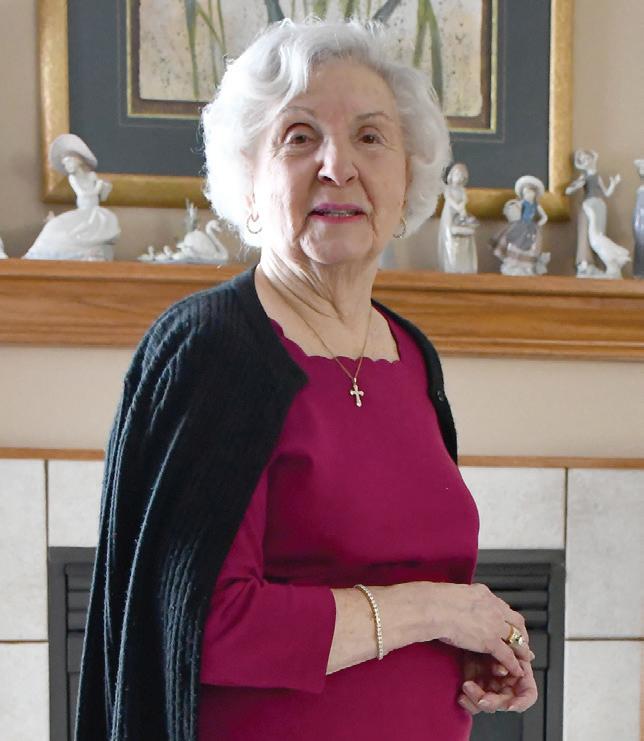16 Young at Heart February 2021 Unified Newspaper Group
Be proactive to keep elders safe, independent Senior Living BY STEPHEN RUDOLPH
M
y friend Bob admits he should have spoken with his mother long ago about home care. They just never found the right time, and now, because his mom’s health is in such decline, Bob and his siblings have to make many hard decisions on her behalf without knowing what their mother really wants. Bob had spoken with me many times while his mom was slipping in her ability to maintain the household. First, she couldn’t go up and down the stairs to do laundry because the washer and dryer were in the basement. She also couldn’t keep the house clean, especially the bathroom. She had difficulty in ambulating and preparing meals and taking her prescription drugs. My suggestion to Bob was, “Don’t delay in getting her help. Be proactive.” But he wasn’t. He procrastinated until it was too late. As a result of a recent fall, she might not be able to remain in her own home much longer. At some time in theirs lives, your elderly parents or another loved one will become unable to care for themselves completely. At that point, you will probably want to hire an in-home caregiver to do things like administer medication, cook some meals and provide your parent or parents with companionship.
to stay there. If you want to help loved ones stay in their home longer, it is useful to start with less intrusive services and increase or decrease the level of help as you gain more knowledge of their habits.
hospitalized are falls, medication errors and nutrition. Find a home safety checklist online and go through it with your loved ones. You can find one at cdc.org.
This might take multiple conversations, as your loved ones might be resistant at first.
Simple fixes include making sure all floors and walkways are clear of clutter, cords and rugs, adding grab bars in the bathroom and stair railings throughout. Also consider updating lights so all rooms are bright and switches are easily accessible, ensuring all appliances work well and are within easy reach and minimizing the need to use step-stools or to bend down low.
You will be told that they are fine and can manage on their own. But we know that all it takes is a slight mishap, a slip, trip or fall or a stovetop fire or missed medications to put them into a downward spiral.
Another thing that will keep your loved ones safe is the ability to easily call for help and keep in touch with family and friends. Isolation and loneliness have a serious negative effect on overall health.
The sooner you make sure they receive services, the longer they will be able to stay in their home.
Their phones should be easy to use and easily accessible, perhaps with large numbers. Consider a medical alert device, if they are open to the idea.
Try to get them to agree to accepting help by focusing on one or two critical needs. After that, slowly add on or lessen services until they’re getting all the help they truly need.
If you want to plan for your parents’ or other loved ones’ care, it is important to involve them and not do it behind their backs or try to trick them. Their involvement helps them see you more as a trusted partner rather than someone who’s swooping in to make changes. It’s a good strategy to estimate future costs so you’ll be prepared. You might want to consult an elder law attorney or financial planner to help.
Some people wait until the very last minute to hire a caregiver for their loved one, but if you can manage to hire one sooner, that is undoubtedly the better option.
Most home care agencies do not charge for an in-home assessment, which provides you the opportunity to have your loved ones begin the process.
Elders overwhelmingly prefer to remain in their home as they get older. They tend to be loath to lose their independence. The sooner they receive services at home, the longer they tend
The top three reasons elders are
Preventing falls and other accidents will go a long way to keeping your parent independent for as long as possible, so consider safety hazards in the house.
If you hire people who can help earlier, that person will get to know your loved one or loved ones when they are still able-bodied. This will allow them to more easily spot issues that arise as their health declines. The longer a caregiver has been with their patient, the better care they are often able to offer. Have that all-important conversation with your parents or other loved ones sooner, rather than putting it off. Because while they might still live at home, their quality of life is important. You want to keep that quality for as long as possible. Stephen Rudolph is a consultant for Comfort Keepers of South Central Wisconsin, a home care agency that provides skilled nursing and personal care services for aging adults, those with disabilities and others needing assistance.








